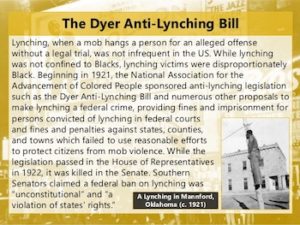
*On this date, 1922, the Dyer Anti-Lynching Bill was introduced.
It was first introduced in 1918 by Representative Leonidas C. Dyer, a Republican from St. Louis, Missouri, in the United States House of Representatives as H.R. 11279. It was intended to establish lynching as a federal crime. The Dyer Anti-Lynching Bill was re-introduced in subsequent sessions of Congress and passed by the U.S. House of Representatives. Still, its passage was halted in the Senate by a filibuster by Southern Democrats, who formed a powerful block that exceeded their percentage of the population by having disenfranchised Blacks.
Attempts to pass similar legislation halted until the Costigan-Wagner Bill of 1934. Subsequent bills followed, but the United States Congress never outlawed lynching due to powerful opposition from Southern senators. It was not until 2018 that the Senate would pass (unanimously) anti-lynching legislation, the Justice for Victims of Lynching Act; the House of Representatives took no action. On February 26, 2020, the House passed a revised version, the Emmett Till Anti-lynching Act, by a vote of 410–4. The Senate is expected to pass it.